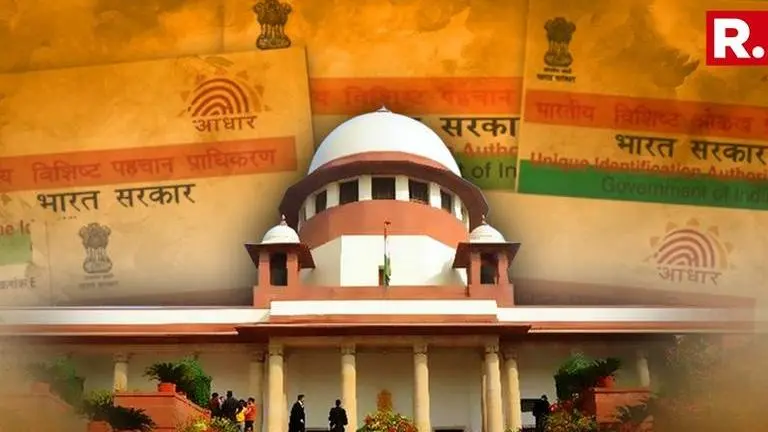Updated 28 September 2018 at 15:55 IST
Supreme Court upholds Aadhaar act with caveats, rules ‘Linking of Aadhaar to mobile phones, bank accounts not mandatory’
Giving push to 'one India, one identity' the majority judgment of the 5-judge bench headed by CJI Dipak Misra in Supreme Court on Wednesday upheld the Aadhaar act with caveats
- India News
- 0 min read

Giving a big push to 'one India, one identity', the 5-judge bench of Supreme Court headed by CJI Dipak Misra in its majority judgment upheld the Aadhaar act with caveats. The bench struck down certain provisions on the aspect of data storage and privacy. While upholding the constitutional validity of Aadhaar, the Supreme Court ruled that linking Aadhaar to bank accounts and mobile phones is not mandatory.
The Apex court also ruled that linking Aadhaar not mandatory for school admissions. The Supreme Court said education is a right and not a benefit. Therefore, Aadhaar cannot be made mandatory for it. It also ruled that Aadhaar passed as a money bill constitutionally valid. Justice DY Chandrachud pronounced the dissenting judgment in the case, who said 'the decision of the speaker of the Lok Sabha to treat Aadhaar as a money bill is subject to judicial scrutiny.'
Earlier in the day, Republic TV spoke exclusively to Aadhaar lawyer in top court, Senior Advocate Rakesh Dwivedi, who said, “It's a massive step taken and shouldn't be dismissed without considering its benefits. We will develop it and strengthen it further. The Supreme court is expected to set some guidelines regarding the same.”
The five-judge constitution bench headed by Chief Justice Dipak Misra had on May 10 reserved the verdict on the matter after a marathon hearing that went on for 38 days, spanning four-and-half months.
As many as 31 petitions, including one by former High Court judge K S Puttaswamy, have been filed in the matter.
When the judgement was reserved by the court, Attorney General K K Venugopal had told the bench, which also comprised Justices A K Sikri, A M Khanwilkar, D Y Chandrachud and Ashok Bhushan, that this matter had become the "second longest" one in terms of days of hearing after the historic Kesavananda Bharati case of 1973.
Advertisement
The Kesavananda Bharati case, which was heard by a 13-judge bench, by a majority of 7:6 had propounded the doctrine of the 'Basic Structure and of the Constitution'. It had held that the amendments which may affect this structure were subject to judicial review.
A battery of senior lawyers, including Shyam Divan, Gopal Subramaniam, Kapil Sibal, P Chidambaram, Arvind Datar, K V Vishwanath, Anand Grover, Sajan Poovayya and a few others, had argued on behalf of the petitioners opposing the Aadhaar Scheme on various grounds.
Advertisement
Besides the former HC judge, the top lawyers argued for petitioners, who included Magsaysay awardee Shanta Sinha, feminist researcher Kalyani Sen Menon, social activists Aruna Roy, Nikhil De, Nachiket Udupa and CPI leader Binoy Visman.
A key argument against the Aadhaar scheme was that it was violative of the nine-judge bench verdict that had held that Right to Privacy is a fundamental right under the Constitution.
Published By : Digital Desk
Published On: 26 September 2018 at 11:58 IST
